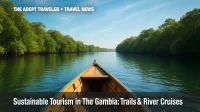Morocco
Embark on a mesmerizing journey as you travel to Morocco, a land where the sun-drenched sands of the Sahara kiss the azure shores of the Atlantic and Mediterranean. The vibrant bazaars of Marrakech call with their kaleidoscope of colors, where the aroma of freshly ground spices mingles with the sweet scent of orange blossoms. As you navigate the labyrinthine streets of the medinas, the sounds of melodic Berber music guide you past ornate mosques and centuries-old souks. Let your taste buds dance with flavors from savory tagines to the delicate sweetness of almond pastillas. The intricate zellij tiles of Fez and the grandeur of the Atlas Mountains whisper stories of ancient empires and age-old craftsmanship. Travel to Morocco and find yourself spellbound by its unique blend of history, culture, and natural beauty, each moment weaving a tapestry of unforgettable memories.
Morocco Travel Season
Travel to Morocco offers an experience rich in culture, history, and diverse landscapes. One of the most crucial aspects to consider when planning your adventure is choosing the best season to visit. Morocco boasts a varied climate due to its geographical diversity, offering unique experiences throughout the year. Understanding the peak and off-peak seasons can significantly enhance your travel experience.
The peak travel season in Morocco typically runs from March to May and September to November. During these months, travelers can enjoy mild temperatures and pleasant weather, making it ideal for exploring the country's vibrant cities, stunning desert landscapes, and picturesque coastal regions. Spring is particularly popular due to the blooming saffron flowers and vibrant greenery in regions like the Middle Atlas. However, being peak season, it's wise to book accommodations and tours in advance as this time attracts crowds, especially in tourist hotspots like Marrakech and Fes.
For those seeking a more intimate experience, traveling to Morocco during the shoulder seasons of late fall and early spring can be rewarding. The weather remains favorable, with cooler mornings and warm afternoons, and visitors can savor the beauty of Morocco without the overwhelming crowds. This is an excellent time for cultural immersion in places like Chefchaouen, known for its blue-washed streets, or attending local events like the Rose Festival in the Dades Valley held in May.
The summer months between June and August, while considered off-peak, offer their own unique advantages for travelers willing to brave the heat. Coastal areas such as Essaouira provide a refreshing escape with their cool Atlantic breezes. The summer is also a time when you can explore the northern reaches of Morocco, like Tangier and the Rif Mountains, where the temperatures are more moderate compared to the searing heat of the southern desert regions.
Winter in Morocco, from December to February, provides a different charm, particularly for those interested in enjoying the festive season in a unique setting. Travelers can experience a distinct contrast, from the warm Saharan sands to the snow-capped Atlas Mountains, where skiing in Oukaïmeden becomes a possibility. The cooler temperatures are perfect for exploring the medinas without the hustle and bustle. Additionally, visiting during off-peak times means fewer visitors and the opportunity to enjoy more personalized experiences.
Travel to Morocco during major local events and festivities can provide enriching cultural insights. One such event is the Marrakech International Film Festival held in December, attracting film enthusiasts from around the world. Ramadan, a significant religious occasion, may affect opening hours and availability of services, but it offers a profound glimpse into the cultural and spiritual fabric of the country, culminating in the Eid al-Fitr festivities.
Travel to Morocco is an endeavor filled with diverse experiences, shaped significantly by the time of year you choose to visit. Whether you’re seeking an adventurous journey through the Sahara, a serene escape to the coast, or a deep dive into Moroccan culture and festivals, planning around the seasons enhances every aspect of your adventure.
The Weather and Seasons in Morocco
When planning a travel to Morocco, understanding its diverse weather patterns is key to ensuring a memorable journey. Morocco's climate is influenced by the Atlantic Ocean, the Mediterranean Sea, and the Sahara Desert, offering travelers a diverse range of weather conditions. The country's geographic variances result in a variety of microclimates, making it an ideal travel destination with remarkable experiences available year-round.
Spring in Morocco
Spring, from March to May, is one of the most favorable times for travel to Morocco. During this period, travelers can expect mild temperatures and blossoming landscapes. In cities like Marrakech, temperatures range between 64°F and 82°F (18°C to 28°C), providing comfortable conditions for exploring Morocco's famous medinas. Rainfall during spring is moderate, with occasional showers more likely in northern regions such as Tangier, where humidity is also relatively higher.
Summer in Morocco
Summer spans June to August, when Morocco becomes a hotspot for sun-seeking travelers. Coastal cities like Casablanca enjoy moderate temperatures, averaging 79°F (26°C), thanks to cool Atlantic breezes. However, in inland areas and near the Sahara Desert, like Fez and Marrakech, temperatures soar dramatically, often exceeding 100°F (38°C). Humidity remains low in these arid regions, though travelers should prepare for the intense heat by staying hydrated and scheduling outdoor activities for early morning or late afternoon.
Autumn in Morocco
Autumn, from September to November, offers serene travel to Morocco, as the intense summer heat fades away. Temperatures become more bearable, with Marrakech experiencing a pleasing range from 64°F to 88°F (18°C to 31°C). The weather allows for comfortable exploration of Morocco’s imperial cities and Sahara tours. Rainfall begins to increase in the north, particularly in areas like Chefchaouen, adding a lushness to the landscape that fascinates any traveler.
Winter in Morocco
Winter, occurring from December to February, brings a unique charm to Morocco. This season is defined by mild temperatures along the coast and cooler conditions inland. Cities like Agadir average around 64°F (18°C), providing pleasant weather for exploring. Meanwhile, the High Atlas Mountains experience snowfall, offering opportunities for winter sports enthusiasts to indulge in activities like skiing. In contrast, areas near the Sahara remain warm during the day but can become quite cold at night, so travelers should pack accordingly. Rainfall is more prevalent in the north during winter, but less frequent in the southern desert regions.
Optimal Travel Times to Morocco
For those planning travel to Morocco, the months of March through May and September through November are considered the optimal seasons. The mild weather is conducive to exploring both cultural landmarks and natural landscapes, and local events and festivals are frequently scheduled during these months. For instance, the Rose Festival in El Kelaa M’gouna in May beautifully showcases Morocco's floral heritage.
Travel to Morocco offers an array of climates, each enriching the experiences the country has to offer. With careful planning, travelers can maximize their enjoyment, aligning their activities with Morocco’s abundant seasonal changes and local events. Whether it's the springtime warmth of Marrakech or the winter wonderland of the Atlas Mountains, Morocco promises unforgettable journeys throughout the year.
Accepted Payment Methods and Other Payment Information in Morocco
When you travel to Morocco, one of the first things you will notice is the use of the local currency, the Moroccan Dirham (MAD). The dirham is subdivided into 100 centimes and is available in various denominations, both in coins and banknotes. As you explore the vibrant markets, labyrinthine medinas, or even the serene Atlas Mountains, having some local currency on hand is crucial as many small vendors and local businesses prefer cash transactions.
Credit card usage is fairly widespread in Morocco, especially in larger cities and tourist-friendly areas. Visa and Mastercard are the most widely accepted card types, and you can use them in many hotels, modern restaurants, and shops frequented by tourists. American Express is accepted at select places, though not as common as Visa or Mastercard, so it might be wise to have an alternative form of payment ready. Discover cards may face limitations, as their acceptance is not as prevalent in Morocco compared to other parts of the world.
When planning your travel to Morocco, it is essential to remember that while major establishments will take credit cards, many have a minimum purchase requirement for card payments. Additionally, rural areas might have limited connectivity for card machines, making cash a more reliable option. ATMs are plentiful in cities and towns, but it's always advised to inform your bank of your travel plans to avoid any issues with withdrawing local currency.
Using cash is a part of everyday Moroccan life, and it's especially useful for making small purchases, like street food, souvenirs from local artisans, or public transport. While abroad, remember to check the exchange rates prior to converting your money to ensure you get the best value. Local currency exchanges and banks are available, but hotels often offer a less favorable rate.
Tipping is also an integral part of the culture when you travel to Morocco. Though not obligatory, it's customary to leave a tip for various services. In restaurants, a tip of 5-10% is appreciated. For smaller services such as porters or taxi drivers, rounding up the fare is generally acceptable. Remember, it is always good to reward exceptional service with a small tip.
Another useful point for travelers to Morocco is the availability of mobile payment solutions. Some places in Morocco now accept mobile payments, reflecting a gradual shift towards digital transactions. However, this might not be the norm everywhere, so it's still prudent to carry some cash.
Before traveling to Morocco, consider downloading language translation apps, as some establishments may have language barriers, making it easier to communicate and understand payment queries. Whether you're wandering through the bustling souks of Marrakech or relaxing in a coastal café in Essaouira, understanding how to manage your payments will enhance your travel experience in Morocco significantly.
Why You Should Travel to Morocco
Travelers seeking a unique and enriching experience should undoubtedly consider a journey to Morocco. This North African gem offers an exotic blend of history, culture, and landscape that promises a memorable vacation.
Rich Cultural Heritage
Travel to Morocco reveals a melting pot of cultures, including Berber, Arab, and French influences. Visitors are treated to diverse languages, customs, and traditions, offering a rich cultural tapestry. Notable sights such as the ancient medinas of Fez and Marrakesh showcase well-preserved examples of traditional Islamic architecture and beautifully demonstrate the country’s historic significance.
Magnificent Historical Sites
A trip to Morocco is like stepping back in time. Travelers can explore ancient ruins like Volubilis, a UNESCO World Heritage site that provides insight into Morocco's Roman past. Additionally, the stunning Kasbah Ait Ben Haddou exemplifies the traditional Moroccan earthen clay architecture and is a breathtaking site frequently used as a location for notable films.
Breathtaking Natural Landscapes
Morocco's natural beauty is unrivaled. From the towering Atlas Mountains to the vast Sahara Desert, the landscapes are astonishingly varied. Adventurers can trek the rugged mountain trails or experience the serene beauty of the desert, where camel rides and overnight stays in Berber tents create unforgettable memories.
Vibrant Markets and Shopping Experiences
The bustling souks of Morocco, particularly those in Marrakesh and Fez, are a sensory feast. Visitors can shop for exquisite handmade goods including textiles, spices, and ceramics while bargaining with local vendors. These vibrant markets encapsulate the lively Moroccan spirit and offer travelers a chance to take home an authentic piece of Morocco.
Exquisite Moroccan Cuisine
Moroccan cuisine is renowned for its aromatic spices and diverse flavors. Dishes like couscous and tagine, prepared with a blend of saffron, cumin, and cinnamon, reflect the country’s cultural richness. Culinary tours and cooking classes in Morocco also offer an immersive experience, allowing travelers to learn the secrets behind classic Moroccan dishes.
Exceptional Hospitality
Moroccans are renowned for their warmth and hospitality, making visitors feel exceptionally welcome. The traditional tea ceremony is an expression of this hospitality, where mint tea is served as a gesture of friendship and bonding. Staying in a riad, a traditional Moroccan house with an interior garden or courtyard, provides travelers with a unique accommodation experience accompanied by exceptional service.
Festivals and Events
Travel to Morocco during one of its vibrant festivals for an unforgettable cultural experience. Events like the Fes Festival of World Sacred Music bring together artists from around the globe and celebrate the spirit of intercultural dialogue and exchange. The cultural richness presented in these festivals adds an exciting dimension to any traveler’s itinerary.
Remote and Charming Villages
Hidden among the mountains and beyond the popular cities, Morocco's lesser-known villages such as Chefchaouen, the blue pearl of the Rif Mountains, lure visitors with their charm. These villages offer a peek into Morocco's rural life, away from the bustling city atmosphere, allowing travelers to witness traditional lifestyles and practices.
Inspiring Art and Design
Morocco is a paradise for art lovers and design enthusiasts. Known for its intricate tile work, stunning rug production, and detailed metalwork, the country offers extensive insights into its artistic legacy. Moroccan artisans have perfected craftsmanship over centuries, and museum visits alongside local art galleries in cities such as Rabat and Casablanca offer rich insights into this vibrant art scene.
Cinematic Landscapes
Music, art, and films have captured Morocco's incredible scenery. Cinematic landscapes like the Sahara Desert and the rocky gorges of Todra and Dades serve as stunning backdrops. Film tourists can visit iconic film locations and thoroughly enjoy Morocco's photogenic and cinematic appeal through guided tours.
The History of Morocco
Morocco's rich tapestry of history stretches back thousands of years, drawing travelers from around the globe to explore its vivid past. The strategic location on the northwestern corner of Africa has made Morocco a crossroads of cultures and a melting pot of influences. This vibrant land has seen the rise and fall of ancient empires, great sultanates, and colonial powers, each leaving an indelible mark on its civilization. Travelers to Morocco are often enchanted by its medinas, palaces, and kasbahs, which tell tales of a time when the country served as a critical link between Africa, Europe, and the Arab world.
One must-see destination for those traveling to Morocco is the city of Marrakesh, known for its medina, a UNESCO World Heritage site where history permeates every corner. Within its walls is the Koutoubia Mosque, a masterpiece of Almohad architecture dating back to the 12th century. Additionally, the Saadian Tombs and the splendid Bahia Palace offer glimpses into the opulence of bygone eras. History lovers cannot miss Fez, Morocco's oldest imperial city, which boasts the world's oldest university, Al Quaraouiyine. Its extensive medieval architecture and maze-like streets present a living museum that transports visitors back to the medieval world.
The country's historical depth is further enriched by its Berber heritage, with the Atlas Mountains and the Sahara Desert regions feeling like hidden gems for adventurous travelers to Morocco. These locales offer insight into the ancient Berber civilization that has thrived in North Africa for millennia. Engaging with this enduring culture reveals a fascinating side of Morocco, particularly in places like the UNESCO-listed Ait Benhaddou, a striking example of earthen architecture impeccably preserved and often used as a backdrop in film. Traveling to these historical sites unveils stories of resilience and adaptation to often harsh environments.
Contemporary Morocco, while preserving its historical legacy, is also a story of modern evolution. Since gaining independence from French and Spanish colonial rule in 1956, the country has embarked on an era of modernization and growth. The vibrant city of Casablanca, for instance, exemplifies Morocco's youthful pulse with its mix of contemporary business districts and art deco architecture. Our journey through Morocco reveals a nation that respects its roots while embracing the dynamics of modernity. Founded on layers of history, Morocco today glories in a blend of Berber, Arab, and European influences that makes it a compelling destination for anyone eager to travel here and witness the past intertwine seamlessly with the present.
The Culture of Morocco
Travel to Morocco and immerse yourself in a vibrant culture that is as diverse as its landscapes. Morocco is a tapestry of rich traditions and diversity, woven from its Berber, Arab, and French influences. As you traverse its cities and villages, you'll encounter an array of cultural hues highlighted in local traditions and daily customs. In Morocco, tea drinking serves as a cornerstone of societal interaction, with Moroccan mint tea symbolizing hospitality and friendship. When invited to indulge in this sweet, fragrant beverage, cherish it as an opportunity to connect with the friendly Moroccan people who take pride in their warm hospitality.
Unique to Morocco is its dazzling array of festivals that encapsulate the spirit of its people. The annual Festival of World Sacred Music in Fes attracts artists and visitors from around the globe, creating a harmonious blend of diverse cultural beats and spiritual expressions. The vibrant Moussem of Tan-Tan, listed by UNESCO as intangible cultural heritage, is an electrifying display of Berber folklore, beautifully illustrating the resilience and heritage of indigenous Moroccan culture. These festivals offer travelers an unmatched experience, showcasing Morocco’s devotion to cultural preservation and celebration.
Artistic expressions in Morocco provide travelers with yet another reason to explore this mesmerizing country. From the intricate geometric patterns in Islamic art, visible in the exquisite mosaics and architecture, to the widespread popularity of traditional craft markets, Moroccan art is a feast for the eyes. The country’s culinary scene is another facet of its diverse cultural tableau. Travelers can savor tagines infused with aromatic spices or explore the fusion of French techniques with local ingredients. Morocco’s rich artistic legacy extends to its music and dance, with traditional Gnawa music offering soulful rhythms that echo the African heritage interwoven into Moroccan culture.
Morocco’s multicultural landscape provides a distinctive cultural journey for those who travel to its shores. The blend of Berber, Arab, and other influences creates a unique cultural experience that is evident in the nation's multilingualism, with Arabic, Berber, and French spoken widely. These cultural influences manifest themselves in the everyday lives of Moroccan people, from the architectural marvels of ancient medinas to the bustling souks where different worlds converge. As you travel to Morocco, you'll witness firsthand the ongoing efforts to preserve indigenous cultures, ensuring that the island's rich cultural tapestry continues to thrive for future generations to appreciate. Morocco, with its multitude of cultural dimensions, stands as a beacon for travelers eager to discover a neatly woven fabric of history, art, and vibrant traditions.
The Culinary Experience of Morocco
The culinary experience awaiting travelers in Morocco is a vibrant tapestry of flavors, colors, and aromas that invigorate the senses. Travelers can expect a deeply rooted culinary tradition that reflects the country's historical influences and diverse culture. From the aromatic spices of the bustling medinas to the elegant culinary creations in upscale restaurants, Morocco's food scene is distinctive and unforgettable. The spices used in Moroccan cuisine—such as saffron, cumin, and cinnamon—are often combined with fresh ingredients, creating rich and flavorful dishes that are at once exotic yet familiar to those who travel to Morocco.
When you travel to Morocco, there are certain dishes you simply must try. The traditional Moroccan tagine, a slow-cooked stew of meat, vegetables, and savory spices, is an iconic dish cooked and served in a unique earthenware pot. Another must-try is couscous, often served as a vegetarian dish but sometimes paired with meat or sweet flavors like raisins and almonds. For a taste of Moroccan street food, consider sampling a warm, buttery M'semen, or indulging in the hearty, grilled kebabs that are offered at many of the bustling food markets. As travelers explore Morocco, pastilla—a sweet and savory pie made with pigeon or chicken, layers of pastry, and dusted with sugar and cinnamon—provides a unique taste sensation.
Beverages play an essential role in Moroccan dining, and travelers should sample local options to fully enjoy their travel experience. Mint tea, also known as "Moroccan whiskey," is a ubiquitous and refreshing drink traditionally served in a ceremonial manner. For those interested in sampling Moroccan wines, the country offers a selection of red, white, and rosé wines from regions like Meknes and the Atlas Mountains. While not as widely consumed, traditional Moroccan spirits such as Mahia, a fig or date liquor, offer a unique local taste. Though beer is less common due to the cultural context, there are nevertheless local breweries crafting unique brews that provide a taste of Moroccan ingenuity.
Marrakech and Fes are two cities where travelers can immerse themselves in Morocco's rich culinary landscape through lively food markets and street eats. Dining at a food stall in the famous Jemaa el-Fnaa square, for instance, offers an adrenaline-filled experience, where spicy aromas, bustling crowds, and musicians captivate all who visit. For those with dietary considerations, many restaurants accommodate vegetarian and vegan options, making use of naturally vegan ingredients like chickpeas, lentils, and citrus fruits. Throughout the year, various food festivals offer travelers a focused glimpse into seasonal Moroccan specialties and regional delicacies, providing another layer of cultural intensity to your travel to Morocco. Whether in simple, home-style eateries or refined upscale establishments, the culinary offerings in Morocco are as diverse and fascinating as the country itself.
What to See and Do in Morocco
Travel to Morocco and explore the rich tapestry of experiences that this vibrant country offers. This diverse destination captivates with its blend of ancient traditions, bustling markets, stunning landscapes, and inviting culture. From the bustling souks to the serene desert landscapes, travelers can delve into a world of discovery and adventure. Whether you're an adventure seeker, a family traveler, or exploring solo, Morocco holds treasures waiting to be uncovered.
The Majestic Atlas Mountains
The Atlas Mountains provide an awe-inspiring backdrop for any travel to Morocco. This majestic range, which stretches across the country, offers countless opportunities for exploration and adventure. Trekkers and adventure seekers can embark on multi-day hiking trips, immersing themselves in the varied landscapes that range from lush valleys to rugged peaks. During winter, the Oukaïmeden resort becomes a hub for skiing enthusiasts. For those less inclined to physical activity, the mountains offer a serene escape with picturesque views perfect for mindful reflection.
Vibrant Souks of Marrakech
Experience the lively essence of Morocco by wandering through the souks of Marrakech. These vibrant markets are teeming with colorful textiles, handcrafted pottery, ornate metalwork, and fragrant spices. Families and solo travelers alike will enjoy haggling with friendly shopkeepers and discovering unique mementos to take home. Visiting the bustling main square, Jemaa el-Fnaa, at sunset reveals a spectacle of street performers, food stalls, and storytellers, creating an atmosphere that is both captivating and enchanting.
The Timeless Medina of Fez
Fez is home to one of the world's most ancient and impressive medinas. A UNESCO World Heritage site, the labyrinthine streets transport travelers back in time. As you travel through the narrow alleys, you'll encounter historical treasures such as the Al Quaraouiyine University, established in 859 AD. This city is a haven for cultural enthusiasts keen to explore its centuries-old madrasas, mosques, and tanneries, which are still operational and open to curious visitors.
Saharan Desert Adventures
A trip to Morocco is not complete without venturing into the vast expanse of the Sahara Desert. The golden dunes of Erg Chebbi near Merzouga offer an unforgettable setting for camel treks. As the sun sets, the sands turn into a kaleidoscope of colors, providing a perfect backdrop for photographers. Adventure seekers can camp under the star-studded sky, enjoying Berber hospitality and traditional music around a fire. This desert experience is a rare opportunity to disconnect and embrace the profound silence of the Sahara.
Chefchaouen: The Blue Pearl
Nestled in the Rif Mountains, Chefchaouen is renowned for its striking blue buildings. This picturesque town is a haven for photographers and those seeking tranquility. Strolling through its winding streets, you can discover local artisan shops selling woven goods and mint tea cafés where travelers can relax. For those who enjoy the outdoors, nearby hiking trails offer stunning views of the surrounding landscapes. Chefchaouen provides a serene escape from the more bustling cities of Morocco.
The Coastal Charm of Essaouira
Essaouira, a port city on the Atlantic coast, is a must-see for those who crave a mix of culture and relaxation. The city’s unique blend of Portuguese, French, and Berber influences is evident in its architecture and culinary offerings. Surfers and water sports enthusiasts will appreciate the robust winds and waves of its beaches. Meanwhile, its UNESCO-listed medina offers charming shops, local fish markets, and an array of art galleries. Families will enjoy the camel rides along the shoreline and exploring the city’s historic ramparts.
A Culinary Journey in Fez
Fez is not just about historical and cultural discovery; it is also a paradise for food lovers. Embark on a culinary journey through the city's food markets and cooking classes. Sample traditional Moroccan dishes, like tagine and couscous, prepared with fresh ingredients and aromatic spices. Dive deeper with a local cooking class to learn how to recreate these flavors at home. This foodie experience provides an opportunity to connect with Moroccan culture through its rich culinary heritage.
Historic Ait Benhaddou
Ait Benhaddou is an ancient fortified village that seems to have sprung from the pages of a history book. A prime example of traditional southern Moroccan architecture, its high earthen walls and richly detailed kasbahs have made it a favorite set for filmmakers. The site is not only a photographer's dream but also offers insight into the historical caravan routes that once traversed the region. Wander through this UNESCO World Heritage site and travel back in time, imagining the bustling trade activity of centuries past.
Relaxation in a Traditional Hammam
No travel to Morocco would be complete without indulging in the rejuvenating experience of a traditional Moroccan hammam. These public bathhouses provide a soothing respite for weary travelers. Enjoy the ritual of steam baths, exfoliating scrubs, and massages using black soap and argan oil. While authentic hammams are found throughout the country, cities like Marrakech offer luxurious spa experiences that blend traditional techniques with modern amenities, making it an ideal activity for solo travelers and couples looking to unwind.
Exploring the Roman Ruins of Volubilis
Volubilis offers a fascinating glimpse into Morocco's ancient past as a part of the Roman Empire. Located near the city of Meknes, this archaeological site features remarkably preserved mosaics, temples, and public buildings. As you explore, you'll be amazed by the extent of the ruins and the detailed artistry of Roman craftsmanship. History buffs and families with older children will find wandering through Volubilis not only educational but also awe-inspiring, providing an enriching addition to any itinerary when you travel to Morocco.
Tips & Tricks for Traveling in Morocco
Respect Local Customs and Traditions
Understanding and respecting local customs is essential when you travel to Morocco. The country is predominantly Muslim, so travelers should dress modestly, particularly when visiting religious sites. Women are advised to cover their shoulders and knees, while men should avoid wearing shorts. When visiting mosques or private homes, it is customary to remove your shoes before entering. Public displays of affection are generally frowned upon, so it’s best to act conservatively in public spaces. Learning a few basic phrases in Arabic or French will go a long way in showing respect and facilitating smoother interactions with locals.
Navigating Public Transportation
For budget-friendly travel in Morocco, public transportation is an excellent option. The country has an extensive network of buses and trains connecting major cities. The train, operated by ONCF, is comfortable, reliable, and best for inter-city travel, particularly between Marrakech, Fes, and Casablanca. For shorter distances, consider taking a CTM or Supratours bus, known for their safety and comfort. In cities, petit taxis are ubiquitous; ensure the driver turns on the meter to avoid overpaying. Additionally, practicing flexible timing is wise, as public transportation can sometimes be delayed.
Bargain Like a Local
Haggling is a common practice in Moroccan markets, known as souks, and mastering this skill can significantly enhance your travel experience. When shopping, particularly in bustling areas like Marrakech's Djemaa el-Fna, prices are often inflated for tourists, so never accept the initial offer. Start by offering half of the asked price, and negotiate to a middle ground that feels fair. While bargaining, remain polite and friendly; it's seen as a cultural exchange rather than a straightforward transaction. If you demonstrate patience and respect, you're more likely to secure a good deal.
Embrace Moroccan Cuisine
One of the highlights of any travel to Morocco is the chance to indulge in the country’s rich culinary offerings. From aromatic tagines to savory couscous, Moroccan cuisine is a feast for the senses. To enjoy authentic flavors, eat where the locals do, such as street vendors or small, bustling eateries. Don’t miss savory street food, like kebabs and bissara (a fava bean soup). For a more immersive experience, consider taking a cooking class to learn how to prepare traditional dishes, which often includes a tour of a local market to select fresh ingredients.
Plan Visits to Avoid Peak Tourist Times
To enjoy a more relaxed exploration during your travel to Morocco, aim to visit popular sites at off-peak hours. The early morning and late afternoons are typically less crowded times to visit attractions like the Majorelle Garden in Marrakech or the ancient Roman ruins of Volubilis. If you’re visiting during a busy season, such as summer or Ramadan, plan accordingly and be ready for some closures or finding fewer crowds by going earlier or later than usual. Additionally, venturing to less-known locations, like Chefchaouen's blue streets, which though popular, offer peaceful retreats when visited at quieter times.
Stay Safe with Vigilance and Local Advice
While Morocco is generally safe for travelers, exercising common-sense precautions will contribute to a worry-free experience. Always keep an eye on your belongings, particularly in crowded markets and transport hubs. Be cautious of scams, such as unsolicited offers of help or guiding services, which may lead to expectations of payment. Seek advice from your hotel or hostel staff about safe areas to visit, especially when traveling alone. Solo travelers, in particular, should remain aware of their surroundings and inform someone of their whereabouts, especially when exploring less crowded areas.
Uncover Morocco’s Natural Beauty
Morocco’s natural landscapes are as stunning as its architectural marvels, making it a dream destination for nature enthusiasts and photographers. Venture beyond the cities to explore the breathtaking Atlas Mountains, perfect for hiking and home to picturesque Berber villages. The Sahara Desert is another must-see; consider taking a camel trek or spending a night under the stars in a traditional Berber tent for a unique experience. Coastal towns like Essaouira and Agadir offer beautiful beaches for relaxation and water sports. Plan your itinerary to include these natural gems and capture inspiring photographs along the way.
Invest in a Local SIM Card
Staying connected is crucial for modern travel, and in Morocco, it’s affordable and straightforward with a local SIM card. Upon arrival, buy a prepaid SIM from popular providers like Maroc Telecom or Orange, available at the airport or numerous stores across cities. Choose a package that suits your data needs, ensuring you have enough for navigation and communication. This not only provides an economical alternative to roaming charges but also offers reliable internet access for apps like Google Maps, essential for navigating unfamiliar streets or finding hidden gems during your travels.
Appreciate the Variety of Accommodations
When you travel to Morocco, the range of accommodations enhances your experience, from luxurious hotels to traditional riads. Riads are beautifully restored traditional homes with central courtyards, providing an authentic stay with personalized touches. For an opulent experience, high-end hotels and resorts offer luxury amenities paired with stunning Moroccan architecture. Budget travelers will also find numerous hostels and guesthouses providing comfort and cultural charm. For a unique adventure, consider a desert camp stay in the Sahara, which often includes local entertainment and gourmet cuisine.
Be Prepared for Weather Variability
Morocco’s weather varies greatly across regions, so packing accordingly is vital. If your travel itinerary includes the northern cities and coastal areas, expect a Mediterranean climate with mild, rainy winters and hot, dry summers. In contrast, the interior desert regions can experience extreme temperatures; hot during the day and cool at night. Bring layers to accommodate these variations, including light, breathable clothing for day excursions and warmer layers for chilly evenings. If heading to the Atlas Mountains, prepare for cooler conditions, even in summer, especially at higher altitudes where temperatures can drop significantly.
What To Know Before You Go to Morocco
When planning your Travel to Morocco, it’s essential to be aware of the entry requirements. Many nationalities can enter Morocco without a visa for stays of up to 90 days, including citizens from the United States, Canada, Australia, and most European countries. However, always check the latest requirements with the Moroccan embassy or consulate in your country before traveling. Vaccinations are not mandatory, but it is recommended to be up-to-date on routine vaccines, and consider inoculation against hepatitis A, hepatitis B, and typhoid, especially if you plan to visit rural areas.
Understanding local customs is key when you Travel to Morocco. Moroccan culture is deeply rooted in Islamic traditions, influencing local customs and etiquette. Dress modestly, particularly in rural areas. For women, wearing loose clothing that covers your arms and legs is advisable. When visiting mosques and religious sites, it's respectful to follow specific dress codes, typically covering shoulders and knees, and sometimes covering your head. Always use your right hand when eating or greeting someone, as the left hand is traditionally considered unclean.
Transportation Options
Travel to Morocco is facilitated by various transportation options. Major cities are well-connected by trains, which are comfortable and affordable. For intercity travel, buses are a common method of transportation, with companies like CTM and Supratours offering reliable services. Consider using taxis (petit taxis for within cities and grand taxis for longer distances) for short distances, but be sure to negotiate fares beforehand as they are often not metered. Renting a car is an option for exploring more remote areas, but make certain you're comfortable with local driving conditions and rules.
Tipping Culture
When you Travel to Morocco, be aware of the local tipping culture. Tipping is customary and expected in many service sectors. At restaurants, a tip of 10-15% of the bill is appropriate if the service charge is not included. In cafes and for taxi rides, rounding up the fare is appreciated. For hotel staff, such as porters and housekeeping, consider tipping around 10-20 MAD (Moroccan Dirham) for their services.
Common Phrases and Communication Tips
Though Arabic is the official language, French is also widely spoken, especially in business and tourism sectors. When you Travel to Morocco, learning a few key phrases can enhance your experience. Common greetings include "Salam alaikum" (hello) and "Shukran" (thank you). In rural areas, some people may speak Berber languages, so having a translation app handy can be useful. Having printed copies of important documents and writing down your accommodation’s name and address in both English and Arabic is advisable for better communication with locals.
Health Precautions and Travel Insurance
Health precautions are vital when you Travel to Morocco. While the country has good healthcare in urban areas, rural healthcare might be limited. It is crucial to have comprehensive Travel insurance that covers medical evacuation. Be cautious with food and water; drink bottled water and avoid raw or undercooked foods to prevent gastrointestinal issues. Protect yourself from the sun with high-SPF sunscreen and a hat, as the Moroccan sun can be intense.
Accessibility in Morocco
Travel to Morocco offers a fascinating experience for all kinds of travelers, but those with specific accessibility needs may find the level of facilities varies significantly. Morocco, a culturally and historically rich country, is gradually improving its infrastructure to accommodate travelers with disabilities, though challenges remain. For those considering travel to Morocco, understanding the accessibility landscape can make a significant difference in planning a successful trip.
Physical Accessibility in Morocco
While major cities like Marrakech, Casablanca, and Rabat are making strides in providing more facilities for travelers with limited mobility, there is still a long way to go. Sidewalks can be uneven, and many older buildings are equipped with stairs rather than ramps, which can present challenges for wheelchair users. However, newer hotels and popular attractions are increasingly offering ramps and accessible restrooms. Travelers to Morocco with mobility issues might prefer to opt for hotels with verified disability access features.
Accessible Public Transportation
Public transportation in Morocco is not uniformly accessible, but improvements are being made, particularly in urban centers. The tram system in Rabat and Casablanca is equipped with wheelchair-accessible facilities, though buses and trains may vary in accessibility. For more reliable options, consider using private transportation services that cater specifically to travelers with disabilities. When planning travel to Morocco, contacting transport providers in advance can ensure a smoother experience.
Accommodations with Accessibility Features
Marrakech and other cities in Morocco are home to an increasing number of hotels and riads that list accessible rooms and features among their amenities. It’s crucial for travelers with disabilities to confirm these facilities directly with the hotel, as actual accessibility can vary. Features such as roll-in showers, grab bars, and door widths that accommodate wheelchairs may be available in newer or renovated properties.
Visual and Auditory Accommodations
Morocco has limited availability of specialized services for travelers with visual or auditory impairments. Few accommodations offer Braille signage, and audio guides in museums or attractions are not widespread. Visitors planning to travel to Morocco with such needs are advised to communicate in advance with potential service providers to understand the available resources.
Accessible Tourist Attractions
Some of Morocco's most popular tourist spots are more accessible than others. The Majorelle Garden in Marrakech is one example of a place that offers pathways amenable to wheelchair users. Many of the country’s historic sites, however, pose accessibility challenges due to their ancient architecture. Efforts are ongoing to improve access, and local guides who understand the needs of tourists with disabilities can greatly enhance the experience of travel to Morocco.
Overall, while Morocco has some way to go in providing comprehensive accessibility, awareness and improvements are on the rise. Travelers with accessibility needs should plan carefully, communicate their requirements, and potentially engage with local guiding services that are experienced in catering to diverse travelers’ needs for a more seamless travel experience.
Health & Safety in Morocco
When planning to travel to Morocco, it's essential to be informed about various safety concerns to ensure a smooth and enjoyable experience. While Morocco is generally considered a safe country for travelers, being aware of potential challenges and taking precautions can enhance your travel experience.
Water Safety
Travelers to Morocco should be cautious with the local water supply. It is generally advised to avoid drinking tap water and instead opt for bottled or boiled water to prevent gastrointestinal issues. Ice cubes in drinks may also be made from tap water, so it's wise to confirm the source if you are concerned. Staying hydrated is important, especially in hotter climates, so always ensure that your water source is safe.
Natural Disaster Risks
Morocco is susceptible to certain natural disasters, such as earthquakes and occasional flooding. Earthquakes are rare, but they have occurred in the past, so it’s prudent to familiarize yourself with basic earthquake safety procedures. Flash floods can happen during heavy rain, often in rural or desert areas. Checking local weather forecasts and seeking advice from locals can help you avoid traveling during adverse conditions.
Crime and Pickpocketing
While crime rates in Morocco are relatively low, petty crime such as pickpocketing and theft can occur, especially in crowded places like markets and popular tourist attractions. To mitigate these risks, travelers should remain vigilant, use money belts or hidden pouches, and avoid displaying valuables openly. Staying informed about your surroundings and trusting your instincts can further help in preventing undesirable situations.
Political and Social Unrest
Morocco is largely stable politically, but travelers should remain aware of their surroundings and avoid any demonstrations or large gatherings that may occur. These events can escalate quickly, so it's advisable to stay informed through local news outlets and heed the advice of local authorities or your embassy.
Health and Safety Precautions
Before traveling to Morocco, ensure you have up-to-date routine vaccinations, as well as those recommended for travel to North Africa. This may include vaccinations for Hepatitis A and B, Typhoid, and Rabies, depending on your planned activities and duration of stay. Healthcare facilities are available in major cities, but the quality of care in rural areas may be limited. It’s wise to travel with a basic first-aid kit and any necessary prescription medications. Travel insurance is highly recommended to cover unexpected health-related expenses.
By considering these safety concerns and taking appropriate precautions, travel to Morocco can be a safe and enriching experience. While enjoying the vibrant culture and stunning landscapes, staying informed and cautious will help ensure your trip is memorable for all the right reasons.
Other Places You Might Like
Chefchaouen, Morocco - Nestled in the Rif Mountains, Chefchaouen is a beguiling town known for its striking blue-washed buildings and vibrant street markets that draw travelers to explore its charming alleys. Visitors who enjoy the vivid colors, rich history, and cultural experiences when they travel to Morocco will find themselves enchanted by the town’s relaxed atmosphere and unique style. Exploring this compact town feels like stepping into a tranquil oasis; it provides a peaceful retreat far removed from the bustling energy of Morocco’s major cities.
Seville, Spain - Steeped in history with a stunning blend of Moorish and Gothic architecture, Seville captivates the imagination not unlike Morocco. The iconic Giralda Tower offers sweeping views reminiscent of the minarets in Moroccan medinas. As you wander through the narrow streets of the Barrio Santa Cruz, the echoes of Andalusian and North African influences intertwine. For those who travel to Morocco, the city’s rich fusion of cultures and vibrant flamenco spirit provide an irresistible calling card to this Spanish gem.
Marrakech, Morocco - Known as the "Red City," Marrakech is a sprawling metropolis that thrives on its rich history and energetic marketplaces. Highlighted by the bustling square of Jemaa el-Fnaa and the enchanting gardens of Majorelle, it offers an intoxicating mix of sensory experiences. Travel enthusiasts are drawn to the city’s distinctive architecture and fascinating traditions. Marrakech feels like a centerpiece showcasing the heart and soul of Morocco, delighting those who seek to discover the country’s myriad charms.
Granada, Spain - With the Alhambra’s elegant palaces and lush gardens, Granada enchants travelers who have a passion for the historical echoes of Moors and Moroccans. This enchanting destination invites visitors to travel through time, admiring the intricate Islamic art and architecture that mirror the majestic creations found in Moroccan cities. Granada’s mixture of old-world charm and modern vibrancy makes it a must-visit for those who appreciate the cultural tapestries of Morocco.
Tangier, Morocco - Situated where Africa meets Europe, Tangier is a city that exudes a bohemian charm and cultural fusion worthy of exploration. Its medina and souks transport visitors to the heart of Moroccan antiquity, while its cafes and writers’ bars hint at a colorful expatriate history. Those who choose to travel to Morocco and explore Tangier will appreciate its position as a gateway between continents, offering a unique viewpoint on shared history and dazzling vistas of both the Mediterranean Sea and the Atlantic Ocean.
Fez, Morocco - Fez, the ancient heart of Moroccan tradition, is a feast for the senses with its labyrinthine medina, an array of artisan workshops, and the mighty Al Quaraouiyine University. History buffs and culture enthusiasts are drawn to Fez’s authentic atmosphere, where each street echoes a rich past much like the enticing medinas of other Moroccan locations. Visiting Fez gives travelers the chance to delve deep into historical craftsmanship and vibrant market life akin to the intricate textures they find compelling in Morocco.
Cairo, Egypt - Cairo’s vast, bustling metropolis offers a fascinating parallel to Morocco’s urban centers with its long history, vibrant markets, and impressive Islamic architecture. Sitting alongside the Pyramids of Giza and the bustling bazaars of Khan el-Khalili, Cairo captures the imagination of those interested in North African cultures with similarities to Moroccan heritage. This city provides a window into both ancient tradition and modern life, sure to captivate anyone who appreciates the multicultural tapestry of Morocco.
Final Thoughts
Embarking on a journey to Morocco promises a tapestry of experiences that captivate the senses and enrich the soul. From the vibrant, bustling markets of Marrakech, where every stall tells a story, to the tranquil, sweeping dunes of the Sahara Desert, Morocco offers a kaleidoscope of landscapes and cultures to explore. Whether you’re wandering through the intricate alleyways of an ancient medina or savoring the rich flavors of traditional Moroccan cuisine, each moment spent in this enchanting country is an invitation to discover something new.
Travel to Morocco is an adventure through time, where you’ll find the perfect blend of history, tradition, and modernity. The hospitality of the Moroccan people, coupled with their rich cultural heritage, ensures that travelers feel warmly welcomed and deeply connected to the heart of the nation. Whether you're relaxing in a traditional riad, hiking in the breathtaking Atlas Mountains, or uncovering the secrets of Fes, Morocco is a destination where endless possibilities await.
For those yearning for a destination that stimulates the senses and inspires the spirit, the call to travel to Morocco is loud and clear. Let the magic of this North African jewel guide you on a journey filled with unforgettable moments and cherished memories. Morocco is ready to reveal its wonders; your adventure begins with a single step.
Atlas Mountains, Morocco

Casablanca, Morocco

Fez, Morocco

Marrakech, Morocco

Safi, Morocco

Strait of Gibraltar

Tangier, Morocco

Tetouan, Morocco

Central Holidays Morocco Tours Add $100 Advisor Bonus

ATTA 2026 Africa Travel Trends Report Highlights

Storm Leonardo Strait Ferries Face Closures Feb 12

Storm Marta Strait Ferries, Andalusia Roads Still Shut

Storm Marta Strait of Gibraltar Ferries Cancelled

Strait of Gibraltar Ferries Disrupted by Storm Leonardo

Carnival Sunshine Barcelona Cruises Add Africa Ports 2027

Morocco Atlas Storms Close Roads, Marrakech Transfers

G Adventures Launches National Geographic Signature

Aurora 35th Sale For Antarctica Cruises, Book By Mar 31

Tarifa Tangier Ferries Canceled in Gibraltar Winds

Safi Floods Road Closures Disrupt Local Services

Royal Air Maroc Adds LAX Casablanca Flights June 2026

Portugal Long Haul Flights Get TAP Premium Economy

2028 World Cruise From Miami To Athens With Azamara
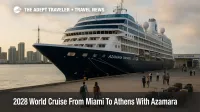
2027 Mediterranean Season Adds Egypt Yacht Voyages
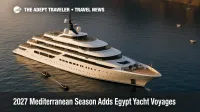
Tetouan Lifestyle Hotel To Open In 2027
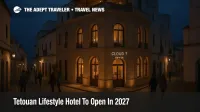
UAE Africa Tourism Plan To Fund $6 Billion Projects

Regional Airline Cancellations Hit African Hubs
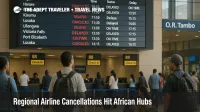
REI Teams With Intrepid For Member Adventure Trips

Flight delays and airport impacts: October 8, 2025

Intrepid unveils Premium Walking and Trekking on 10 trips
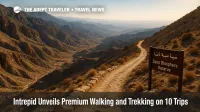
Mozambique Lowers Advisory, but Northern Hotspots Persist

Intrepid Travel Mystery Tour Promises 14-Day African Adventure
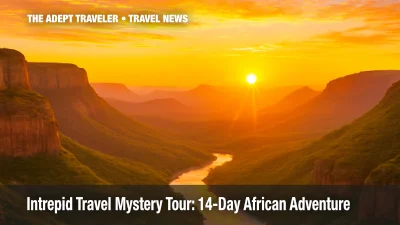
How The Gambia Is Turning Trails and River Cruises into a Model of Sustainable Tourism
